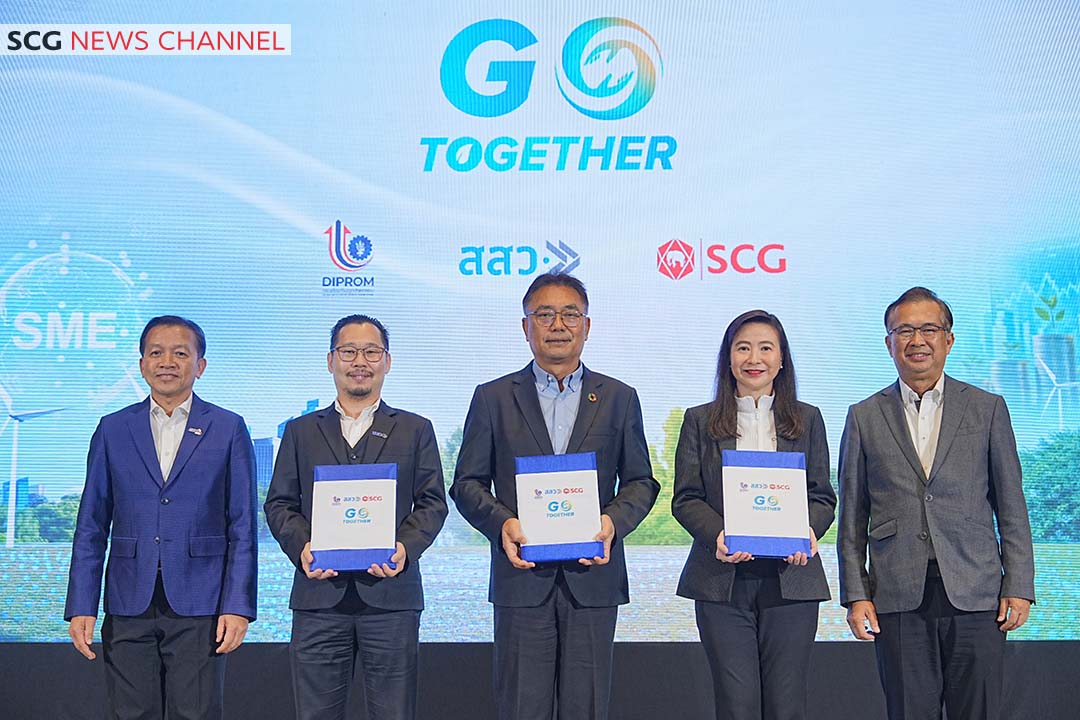August 15, 2025: Bangkok – SCG, in collaboration with government agencies, private sector organizations, and partner networks, is advancing two major initiatives: the Net Zero Accelerator Program 2026 (NZAP 2026) course and the Go Together Project Season 2. These programs aim to support Thai entrepreneurs, particularly SMEs, in adapting and enhancing their competitive capabilities amid challenges while facilitating a concrete transition to low-carbon business operations and sustainable growth under the Inclusive Green Growth approach. Following the previous success that exceeded targets with over 1,400 participants nationwide, the organization is preparing to advance intensive course development to strengthen capabilities and precisely address SME needs.
Dr. Chana Poomee, Chief Sustainability Officer at SCG, stated that SMEs represent the cornerstone of Thailand’s economy, generating over 35% of GDP and employing more than 70% of the national workforce. Currently, SMEs face comprehensive challenges including high costs, intense competition, rapidly changing technology, and pressure from global environmental standards. Therefore, adaptation is not merely an option but the only path to business survival.
The previous NZAP 2025 course and Go Together Project’s first season attracted over 1,400 participants nationwide, reflecting the readiness of SME entrepreneurs to transition concretely toward low-carbon business operations while building strong collaborative networks and achieving practical greenhouse gas reductions. Based on these clear results, the initiative continues into 2026 with more intensive courses and increased participation from diverse partners to expand opportunities and enhance competitive capabilities for sustainable growth of Thai SMEs under the Inclusive Green Growth approach, emphasizing multi-sector collaboration toward a low-carbon society.
In the second year of NZAP 2026 and Go Together Project Season 2, course development has been intensified with expanded partner networks to accommodate increasing SME entrepreneurs. The NZAP 2026 course extends the training period from 8 weeks to 12 weeks, while the Go Together Project Season 2 focuses on strengthening SME capabilities through actual field study visits, expert consultation access, and opportunities to access technology and funding sources. The Department of Industrial Promotion and the Office of Small and Medium Enterprises Promotion have joined as new partners.
However, real transformation emerges from the power of multi-sector collaboration that collectively transfers knowledge and support to SMEs for concrete advancement toward low-carbon business operations. Multiple government agencies have collaborated to drive concrete policies and support measures to enable timely SME adaptation, with the Department of Industrial Promotion serving as a key partner.
Ms. Natthiya Netayasupha, Director-General of the Department of Industrial Promotion (DIPROM), explained that the department is advancing the “DIPROM Community: Here We Give” policy through the “4 Givings, 1 Reform” approach to promote Thai businesses that benefit communities. This involves encouraging entrepreneurs to adopt BCG concepts for improving production processes and environmental management according to green industry guidelines for small and medium enterprises, facilitating Thailand’s industrial transition toward Industry 5.0 in alignment with the policy of “Industrial Reform Toward a Modern, Clean, Convenient, and Transparent New Economy.”
Simultaneously, private sector organizations like SCG continue supporting SMEs for sustainable competitiveness through NZAP courses and Go Together projects, focusing on three approaches: enhancing capabilities through technology such as AI and digital technology applications to increase efficiency while upgrading workforce skills to handle complex, higher-value-added work in the future; promoting alternative energy use in the business sector to reduce energy costs while concretely reducing carbon emissions; and creating multi-sector participation, which serves as the key to success through pilot projects such as the Saraburi Sandbox project—a collaborative model among government, private sector, and civil society that creates spaces for testing alternative energy and low-carbon technology with nationwide expansion to drive sustainable green economy development.
Dr. Chana concluded that with genuine collaboration and serious action from all sectors, the challenges can be overcome while collectively driving Thai SMEs toward strong and sustainable growth for the country’s future.

Published on: Aug 15, 2025